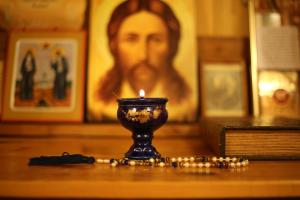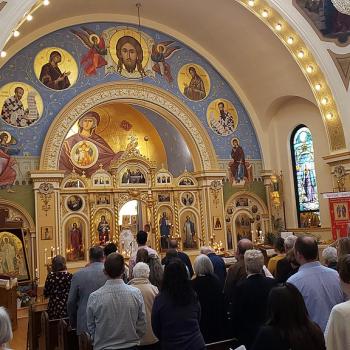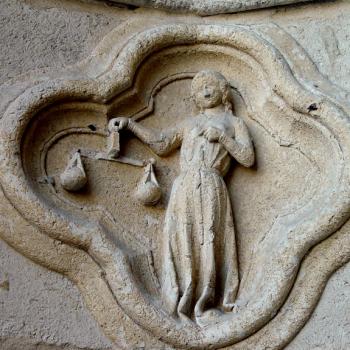
The Sabbath was made for us. The liturgy was established for us. God does not need our worship. We are the ones in need. We need the grace of God in our lives. Worship, authentic worship, is done out of love. When we reach out in love to God, we ready ourselves to receive God’s love in return. Worship allows us to express that love, and indeed, to rejoice and celebrate it. True worship helps us tune ourselves in with God, not because God cannot engage us without it, but because God desires to make room for us and our will, to allow us to be the ones to choose whether we will embrace the love and grace God offers us instead of forcing it upon us.
God is not bound by the liturgy, that is, the liturgy is not the only way we can and will encounter God. The liturgy is for our benefit. This is why, if we have a good reason why we should not go to it on a Sunday, God will not condemn us, nor will we find ourselves outside of God’s love and grace. For the whole point of liturgy, with all the prayers we say in it, is to help us grow in love and grace. But because God engages us out of love, God will also interact with us in other situations and contexts as well. This is why those who are legalistic about worship, those who say it is all about God and what we can do for God, that we owe God such worship, do not really understand what the liturgy is about. God wants our love, to be sure, because God loves us. Love desires love in return. Our worship of God should be the reflection of our love for God, our expression of that love, our expression of our thanksgiving and wonder. How can that properly be done in a legalistic fashion? This is not to say that the church cannot and should not provide general guidelines, which includes a general expectation for the faithful to participate in liturgical worship, but some go too far when they think such expectations are absolutes, overriding any need we might have; for, again, the liturgy and the worship which we do is for our own sake. This is why God, who loves us, would not want us to wantonly abandon our earthly needs, or the needs of others, just to fulfill some liturgical obligation. This is exactly the point Jesus made when he was told he should not be healing on the Sabbath: the Sabbath was made for the good of the people and so he would continue to promote the purpose of the Sabbath over any attempt to use legalistic obligations as a means to subvert that good:
But the ruler of the synagogue, indignant because Jesus had healed on the sabbath, said to the people, “There are six days on which work ought to be done; come on those days and be healed, and not on the sabbath day.” Then the Lord answered him, “You hypocrites! Does not each of you on the sabbath untie his ox or his ass from the manger, and lead it away to water it? And ought not this woman, a daughter of Abraham whom Satan bound for eighteen years, be loosed from this bond on the sabbath day?” As he said this, all his adversaries were put to shame; and all the people rejoiced at all the glorious things that were done by him (Lk. 13:14- 17 RSV).
Jesus, as God, had been healing on the Sabbath since the Sabbath had been established; God had always worked on the Sabbath, providing those who came to worship the grace which they asked for and needed. The point of the Sabbath was lost when it became seen purely as a legalistic obligation, for it must be remembered, it was originally established so as to make sure the faithful had a time to rest, and during that time of rest, they could and would thank God for all the gifts they had received. The Sabbath did not override people’s needs, but rather, was meant to help fulfill them. If someone needed to be healed, then healing them gives them what they need, and so by healing them, Jesus fulfilled the Sabbath more than those who would have him do nothing and let people needlessly suffer.
Those who are sick have needs, and those needs most often can be better fulfilled staying at home, resting, getting medical attention if necessary, than by going to church. Indeed, by going to church, the sick risk infecting others, and even if they feel they are not so adversely affected by their illness, they do not know how it will affect those they would come in contact with if they go to church. Since we are called to care for our neighbor, then we should show that care by not putting others needlessly at risk; if we are sick, we have a good reason not to go to church. How many understand this? How many think they must go, no matter how sick they are? Even if they know they do not have to go, they think it is more important to go than not, showing they do not really understand what it is they are doing. By going, by putting others needlessly at risk, they go against the spirit of the liturgy itself. This is a major problem in churches; so many go while sick; they can be heard coughing and sneezing throughout the service, sometimes not even caring to cover their face when they do so. Their actions show they do not care for their neighbor, but only themselves. They are selfish, and their reasons for going to church are selfish. This selfishness was and continues to be highlighted with the reaction many have had to COVID19; many of the so-called faithful wanted to act as if things were normal and no one should tell them what to do (even if they were sick, and could infect and kill others if they came in contact with them at church). To justify themselves, some tried to act like they wanted to obey the demands of God, but in saying that, it is clear they ignore the actual expectations God had for them. Jesus, after all, said we should take care of our neighbor before all else (as he expressed in the telling of the parable of the Good Samaritan).
If we are to worship God, we must make sure we actually follow the expectations God has for us. God is love. God desires all should be saved. God desires us to take care of our neighbor. God reveals to us the needs of the poor and tells us to look after them. True worship is done in and through love, a love which not only opens us up so that we can commune with God, but it also opens us up so that we can join in and commune with others in their communion with God. Anything which would get in the way of this, especially selfish desires which makes us try to save ourselves at the expense of others, must be cast aside. Only by dying to the self can we truly live. The wiles of the devil are many, including false piety. We must deny ourselves, for then we can find our true strength in God; how else can we follow Paul and put on “the armor of God” unless we first cast off the clothing of selfishness? We must stand in truth and have the breastplate of righteousness – not a sham righteousness of our own making, but the righteousness of Christ, the righteousness of the servant of servants who was willing to die and perish for the sake of all. When we do this, we can stand in peace, knowing that all the works of unlove will have no place with us; we will truly have found the true faith, a faith which is in the God who is love.
Stay in touch! Like A Little Bit of Nothing on Facebook.
If you liked what you read, please consider sharing it with your friends and family!













